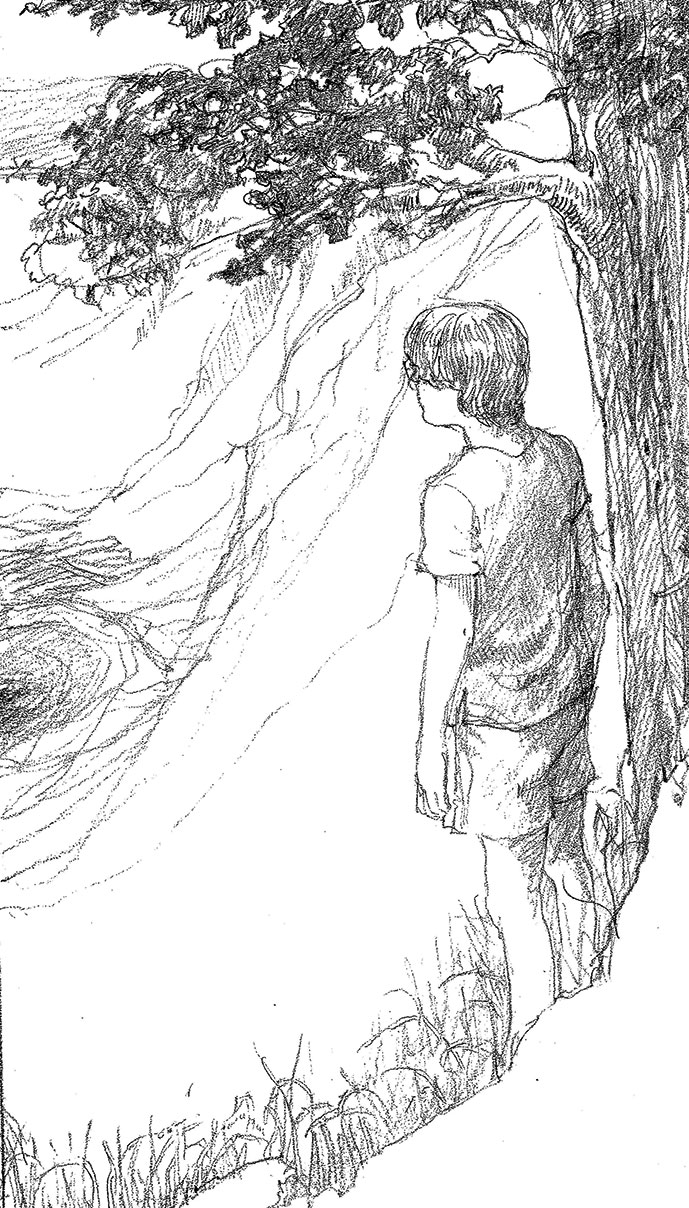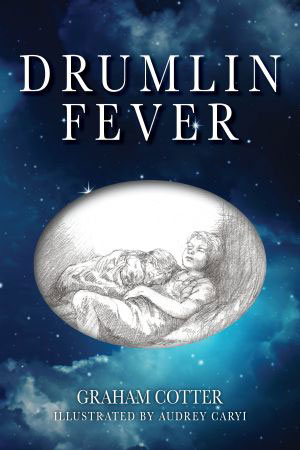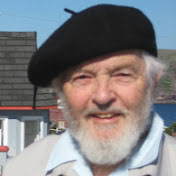Drumlin Fever
by Graham Cotter
What Brian Found

Illustration by Audrey Caryi
Brian finally gave up trying to count the legs of the sowbug, and gathered a collection of them in a little match box he always carried around. He remembered hearing in school that they were not insects at all, but Crustaceans, like crabs and lobsters, and he wondered if he could cook and eat them.
He looked around; there was no sign of Kevin, nor was there any sound. He must have spent longer with the rotted log than he had thought. He remembered that he was supposed to be Intelligence Officer, and after trying to connect sow bugs with Bondworthy, and the Triple O, decided that he had better catch up with others. Off he went down the trail.
What he did not know, however, was that the Commander in Chief and the Recce had changed plans without consulting him. Thus it was that Brian passed by the field where his brothers in arms were at that moment on elbows, stomachs, and knees wriggling through the grass to the survey party, and went on, up the slight rise, which was really a grown-over sandhill, and, then, very cautiously, slipping from tree to tree, through the rest of the roadway down to the culvert. Here the others, he thought, would have got into the ditch and followed the river bed well into enemy territory.
He scanned the ditch near the mouth of the culvert there was a muddy dampness to the earth, but no footprints. But then, he thought, Kev and Bart would be too clever to leave footprints. They would have walked along the grassy verge until the river bottom was entirely dry and then moved along it. So he followed in what he imagined to be their steps, and moved quietly further.
A riverbed, dry or running, is always a wonder. First, the water has cut a gully, in this case five or six feet deep by the culvert. Willows and alders grow along the bank; if the stream does not run strong all year some trees will grow deep in the gully, and recover during July and August from their spring drowning. The stream bed Brian walked along had very little standing water left in it, even in June, but the moist soil was host to ferns and mosses, bloodroot, wild leek – those were the plants he could name. Here and there young cedars sprouted, but there were few other evergreens.
The gully went straight about a hundred yards from the culvert, and then began to twist and turn. Here the river bed was more interesting to Brian, with more small boulders, over-washed and undermined when the water had been running; the occasional log fallen across, which might have provided a bridge a month before, but provided an obstacle now; further obstacles in twists of grapevine which had fallen along their decaying hosts, into his way. These challenges added immensely to Brian’s pleasures in manoeuvre; where Kevin would have chopped his way through, like Blackbeard getting past obstacles, Brian moved with the least damage to nature and the greatest credit to himself. Besides, he could always reason that the less sign of disturbance the less likelihood of the Enemy detecting him. He puzzled however, that he did not find any sign of Bart or Kevin having come this way. But he stuck to the plan as he understood it.
He found a more serious obstacle across the now shallower ditch: a barbed wire fence, quite old, but very much in place. Brian knew how to tackle this, but although he was freer of allergic reaction today than he could remember, he always had to be careful of scratches from rusty metal, not only for fear of tetanus – for which he was properly immunized – but for fear of rashes and infection to which he was especially subject.
The fence marked in fact, the old boundary of the land which had been sold to Triple O with Letcherly’s land, through which Brian was passing. Beyond the fence the ditch became much shallower, and had fewer trees and shrubs growing along its way; a hundred yards in, bulldozers had begun to replace the waterway with field tile and to fill in. So Brian had to find another point of vantage to observe what was happening. He looked along, not the ditch, but the line of fencing, erratic as it was, and spotted a good cedar tree, twenty-five feet high. Looking about cautiously, for he was now on the edge of the Triple O activity, and the roar of earth movers, chain saws and concrete mixers drowned any noise he could make breaking twigs under foot. There were not many people in sight, and those intent on their machines. So he walked quietly without the dramatics which would have gladdened Bart’s soul on such an occasion, over to the cedar and climbed as high and as he safely could.
The view was excellent. The site chosen for the Lodge headquarters of the Triple O had been a low rising hill about three acres in size covered thickly with hardwood trees on the east – the side nearest the village, and with the remains of the apple orchard over the rest. There had been a small log stable just at the foot of the hill, and a farm track from the stable around the curve of the hill to where the farm house had stood out of sight. Brian knew the hill well, for he had often come here to gather apples and windfalls and the boys had had some good war games between the orchard and the woods.
The scene of devastation shook even Brian’s cool. Half the hardwood woodland was gone, from what Brian could see, the Triple O had no sense of its commercial value even, for there were stacks of wood piled as if for burning. Every apple tree had gone, topsoil and subsoil was ripped away by giant earthmovers. Again, the development corporation had overlooked the saleable value of the topsoil: it had been piled along the track which led round the hill to the old farm house. The log stable had been bulldozed down, the fine old logs splintered and lying in a heap, etched with white flakes of caulking: no salvage seemed intended here either.
The hill had been laid flat, scraped and ploughed, glacial boulders which had been buried since thousands of tons and hundreds of feet of ice had ground and polished them, had been exposed to the air, split, blasted, and arranged in rows to make some kind of rough wall at the end. Where the stable had been, a deep evacuation seemed to be preparation for a swimming pool: where the best apple trees had stood, was another pit and piles of concrete building blocks with shreds of plastic waving from their midst indicated the foundations of the Lodge. Brian could just make out three or four places where some mysterious digging had gone on; then he saw the well drillers’ contraption and concluded that the other holes had been made by it.
Of Kevin and Bart there was no sign, nor was there any suitable place from which they might be observing this desecration of the hillside. Brian wondered where they must be, and was just about to come down from his perch, when he heard voices, and saw two men approaching.
One was Bondworthy, in his accustomed green suit, and wearing shoes which were not meant for the dust and grit of the evacuations. He was waving his hands as he talked to his companion. The latter was someone Brian had not seen before, a young man with longish well groomed hair, obviously just up from the city, and having as much trouble with the dirt on his shoes as Bondworthy.
“Son, you see, this will be the Lodge, and radiating from it will be the two to four acre lots of the clients. The Lodge will provide a recreation and shopping centre, exclusively for the participants of Own Your Own Ontario.”
“Will it be able to pay for itself as a shopping centre if it’s so exclusive?”
“Of course, when all these hills you see around are dotted with our customers and they are tied by contract to using it. It will be a bigger village than Warkworth.”
“I see. Are all your plans approved by Nautilus?”
“Certainly. Nautilus has the best interests of Ontario citizens at heart, of those at any rate who wish to participate in our ancestral heritage of land.”
His tone shifted from that of salesman to that of the conspirator:
“In any case, we are going to make ten times our costs on the land itself, and a big cut of that will go to Nautilus as our prime investor.”
“Ten times? – whew!”
“You’re with a good outfit. Plenty of chance for advancement, and a good slice of the profits!”
“Is everything here going according to plan?”
“Ye–es, except for water. We don’t seem to be able to get any water, though the farmer had a good well at his house, which suddenly dried up when we took over.”
“Think he was ripping you off?”
“We tested it ourselves. Old dummy hadn’t the brains to deceive us. Dealing with these hicks is like slicing butter. Except for that red-headed bugger on the hill over there.”
“Who’s that?”
“Scace. Thinks he owns the place. Works for the county. We’ll get him. I phoned old Hugesson himself about him.”
“You spoke to Mr. Hugesson. Gee, I didn’t think he ever spoke to anyone!”
“I got special word to phone him if I had any trouble with civil servants or politicians. He knows how to put them in their place.”
“Mr. Bondworthy, now that we’re well out of earshot from your employees, I must give you a special message from the company’s lawyers in Toronto. It seems there are some problems you should know about.”
“Oh, what kind of problems?” Bondworthy’s fat brow creased, and Brian leaned over to see his expression more clearly. His one regret at Bondworthy’s leaving the house so suddenly yesterday was because he could go on looking at the smooth ivory flesh and fat jowls much as he looked at certain translucent stone – chalcedony, he thought it was – which suggested that the same white soap-like tissue was found all the way in. Unfortunately, Brian leaned too far, and a branch broke. He saved himself from falling, and landed with a further crackle of twigs, four feet further down the tree.
“Say, Mr. Bondworthy, there’s someone up the tree. It’s a kid.”
“Hey, you, get out of that tree!” Bondworthy shouted, “Don’t you know that you’re on private property! You can be arrested for trespassing. This land belongs to Own Your Own Ontario Development Corporation!”
By the time Bondworthy had got through the tirade, Brian was down the tree, and the young city man had him by the shoulders. Anger and astonishment spread across the older man’s face as he recognized the red hair, but before he could say anything, Brian spat out:
“I heard you call my Daddy a bugger! I’m going to tell Daddy you called him a bugger, and you’ll be sorry!”
He wrenched himself free from the young man and ran to the other side of the tree. Bondworthy held out his hand to his companion, saying,
“Better leave him be, even if he is trespassing. Best not to touch him. You know how some people are when men do anything to a boy.”
“If I had my way, I’d give him a licking, right now!”
Brian stood there, his eyes blazing. He was seldom angry, but the combined effort of his anger and his red hair, and the goggly glasses, was enough to deter even a rising young executive from the bank towers of Toronto. As he backed off, Brian leaned down and picked up a stone with one hand and a stick in the other, just in case. All the while he wished he had taken judo like Bartholomew Cart. He moved, still backing, facing the two men. Then all three of them heard a jeep approaching, over the din of the machinery. Brian used the distraction to turn and run for the dry stream bed, and by the time the men looked round from watching the jeep approach, he had disappeared.
“Any luck with the water?” called out Bondsworthy to Carl O’Donnell as the jeep stopped.
“No luck at all, Mr. Bondworthy,” said Carl, digging Todeski in the ribs.
“Better try somewhere else. Better get the driller back too. Toad here has to blast away at some of them rocks on the hill.”
That was the last Brian heard as he made his way along the escape route. But he kept the stone and stick, just in case. He was an Intelligence man, not a front liner, and the experience had shaken him.
Drumlin Fever is now Available for Sale
Great News! Drumlin Fever has now been published. (Sept 2020)

The cost is $20 + $8 shipping and handling if delivered within Canada.

